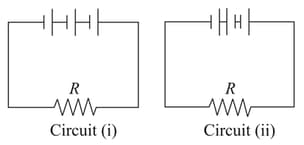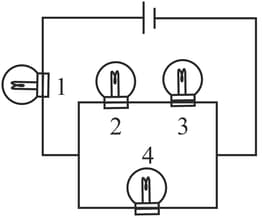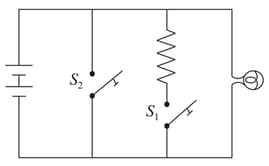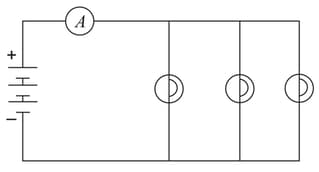EASY
JEE Advanced
IMPORTANT
Earn 100
identical bulbs are connected in series and illuminated by a power supply. One of the bulbs gets fused. The fused bulb is removed and the remaining bulbs are again illuminated by the same power supply. Find the fractional change in the illumination of all the bulbs.

Important Questions on Heating Effects of Current
MEDIUM
JEE Advanced
IMPORTANT
identical bulbs are connected in series and illuminated by a power supply. One of the bulbs gets fused. The fused bulb is removed and the remaining bulbs are again illuminated by the same power supply. Find the fractional change in the illumination of one bulb.
EASY
JEE Advanced
IMPORTANT
An electric motor is designed to work at and draws a current of . The output power supplied by the motor is , and the remaining goes to heat. What is the resistance of the windings of the motor and its percentage efficiency?
EASY
JEE Advanced
IMPORTANT
A voltage stabilizer restricts the voltage output to . If the electric bulb rated , is connected to it, what will be the minimum and maximum power consumed by it?
MEDIUM
JEE Advanced
IMPORTANT
The operating temperature of the filament of the lamp is . The temperature coefficient of the material of the filament is . If the atmospheric temperature is , then the current in the lamp when it is switched on is nearest to,
MEDIUM
JEE Advanced
IMPORTANT
Three identical cells each having an emf and a constant internal resistance , are connected in series with a resistor , first as in the circuit and second as in the circuit .

Then
EASY
JEE Advanced
IMPORTANT
All bulbs in the figure are identical. Which bulb lights more brightly?

EASY
JEE Advanced
IMPORTANT
Which of the two switches and shown in figure will produce short-circuiting?

MEDIUM
JEE Advanced
IMPORTANT
Three similar light bulbs are connected to a voltage DC supply as shown in the figure. Each bulb operates at normal brightness and the ammeter (of negligible resistance) registers a steady current. The filament of one of the bulbs breaks. What happens to the ammeter reading and to the brightness of the remaining bulbs?

